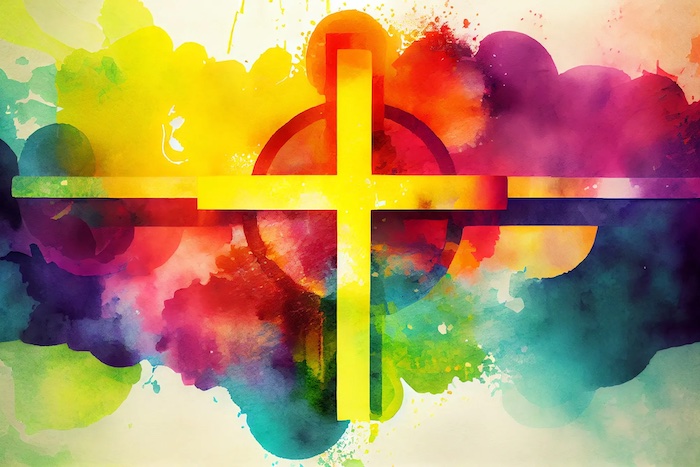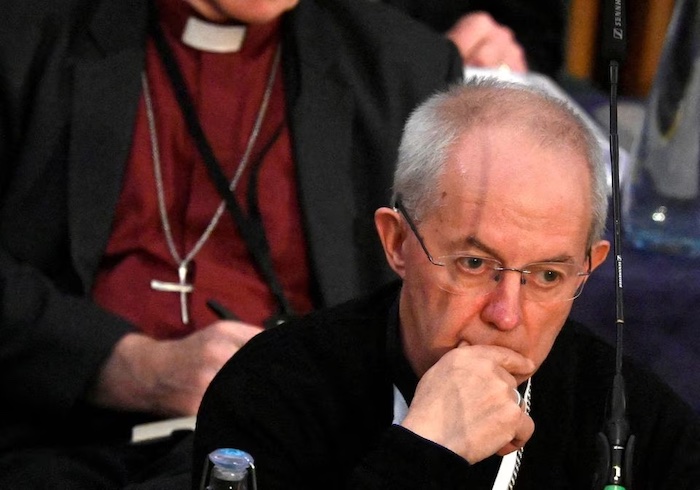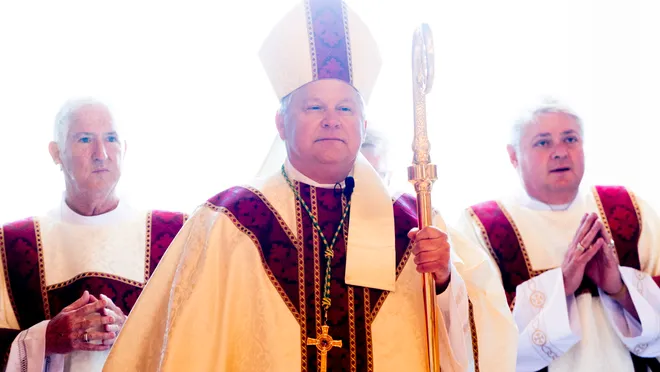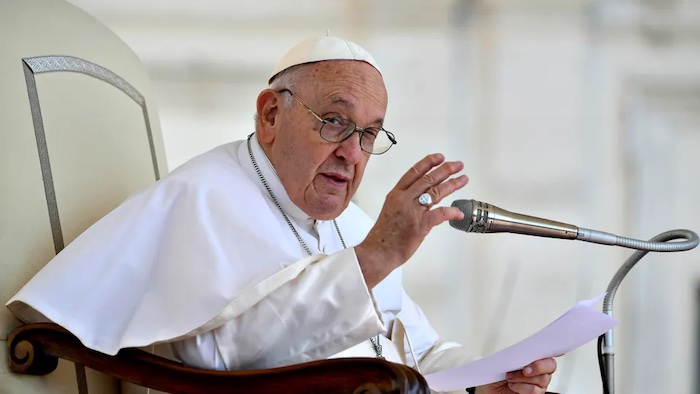
by Patric Peters>
I recently saw a sponsored social media post by a Catholic that said “Call the LGBTQ community for what they are: sexual degenerates.” A Catholic website garnered over 90,000 signatures in attempts to stop a recent LGBTQ ministry conference at Fordham University — a conference whose modest goal was “to build community, share best practices and worship together.” Meanwhile, a prominent Catholic speaker campaigns to “Reclaim the Month” of June — with t-shirts and everything! — for the Sacred Heart of Jesus, which is apparently threatened by Pride month.
And this is just a mild sample — and all in my limited purview as a Catholic whose experience with LGBTQ support has otherwise been generally positive.
Unsurprisingly, the Christian community at large offers a range of perspectives on LGBTQ issues. Many progressive churches perform same-sex marriages, ordain openly gay ministers, and embrace theologies that allow for a more inclusive sexual anthropology. Many other churches maintain a traditional Christian sexual ethic and understanding of marriage. The Catholic Church itself, while officially upholding its longstanding sexual teaching and ethics, varies largely in its approach to LGBTQ issues and support of LGBTQ persons.
While it may be true that many traditional communities are not openly hostile to the LGBTQ community, one may nevertheless feel unwelcome simply for being gay or trans. Indeed, as the abovementioned examples demonstrate, some Christians go at length to stress that LGBTQ persons aren’t welcome. Moreover, many churches do not offer opportunities for their LGBTQ individuals to flourish and offer their own gifts.
In other words, many churches do not encourage their LGBTQ members to be, well, church. But it shouldn’t be like this. All churches — conservative or progressive, Catholic or otherwise — should welcome, appreciate, and care for LGBTQ persons. Here are seven reasons why.
1. Because LGBTQ above all refers to individual persons and not merely any moral or political issue.
We’re so accustomed to relating LGBTQ to the so-called “hot button” issues of the day — often in the realm of political ideology and activism — that we forget the faces behind the acronym. But to put first things first, LGBTQ individuals are (surprise!) people. Whether gay, lesbian, trans, or straight, all of us are made in the image and likeness of God. Each person is stamped with an intrinsic dignity, no matter one’s experiences, struggles, and weaknesses.
God calls every person into relationship with him. The human person is literally designed for intimate communion with his Creator, and being homosexual, bisexual, or transgender doesn’t change this. The Church’s job is to advance — not obstruct — every person’s relationship with God in its work of evangelization and pastoral care. It’s no secret that the Catholic Church adheres to a traditional Christian understanding of marriage and the family. But consider how Pope Francis nevertheless addresses the need to affirm the dignity of those who are gay:
“We would like before all else to reaffirm that every person, regardless of sexual orientation, ought to be respected in his or her dignity and treated with consideration” (Amoris Laetitia 250).
Affirming the dignity of the LGBTQ person involves an appreciation and engagement with the concrete reality of the individual. The call to accompany the person — in view of her experiences, however complex and messy — is therefore more important than a mere recitation of abstract principles. “Realities are greater than ideas,” as Pope Francis would say. When we consider the Holy Father’s own approach, it makes sense that our reasons for LGBTQ support should begin with this basic call to encounter other persons as persons. Rather than have a ready-made answer from the “realm of pure ideas,” we are called to accompany the person in the specific situations of her life — even if (and especially if) they challenge our usual ways of thinking (Evangelli Gaudium 232).
2. Because the Church is for everyone.
The Church is for everyone. That’s what the word “catholic” means: the Church is universal, encompassing all kinds of people. “There is neither Jew nor Greek, slave nor free, male nor female,” as Paul says, for we are “all one in Jesus Christ” (Gal. 3:28). So why does it seem like our churches pick out LGBTQ persons to the extent of making them “other”? There is no other in the Body of Christ. As I once heard a priest say, there is no “them and us” — there’s only “us.”
Because the Church is one big Us, we cannot go about our lives while disregarding the rest of our brothers and sisters, particularly those in need. Paul likens the Church to a body with many parts — a union so intense that “if one part suffers,” then “every part suffers with it” (1 Cor 12:26). Do our churches recognize the suffering endured by many of its LGBTQ children? Do some of our churches actually make the lives of LGBTQ Christians more difficult, whether by simply acting as bystanders or by actively engaging in insensitive rhetoric?
The challenge of the Church is to ever expand its tent, for its mission is to the gather the human family into the Family of God. Many Catholics are shocked by such outreach, but often those we consider “outside” the Church are precisely those who most belong. Then again, this is the way of the Kingdom. In his earthly ministry, Christ initiated the in-gathering of the Kingdom of God by going to — and preferring — those otherwise considered outside the household of God. The Church, says Pope Francis, has to “go forth to everyone without exception” because in the Church “there is a place for everyone, with all their problems” (EG 47-48).
3. Because, well, Jesus.
When it comes to reaching out to LGBTQ persons, then, we have a solid foundation in the example of Christ himself. It sounds cliché, but really, what would Jesus do? If one searches for the Jesus of the Gospels, it’s not hard to find a guy who is compassionately concerned for the outcast and other. Christ preferred the poor, the sick, the sinner. Christ went to the margins — to those otherwise excluded from society. It doesn’t seem like too much of a stretch to imagine a gay man in that category, does it?
Many Christians counter by pointing to a Jesus who “loved in truth” (with a firm emphasis on “truth”), who would “name the sin for what it is.” They will argue that Christ may have reached out to the outcast, but only for the sake of the individual’s salvation. According to this line of thinking, the emphasis is not on accompaniment per se but really about conversion. In this view, the most necessary part of Christ’s outreach involves a demand that the sinner turns away from her sin. But we must realize that first Christ invited those he encountered into a deeper relationship with himself, and this relationship is the seed from which conversion grows. What he did in his encounter with the Samaritan woman at the well, he does with all of his broken, would-be followers. Jesus calls us into a deeper life founded on himself. And even here, the focus of Christ is not on condemnation but on how an intimate relationship with Christ is the only way to transform our lives and set us on a trajectory for true fulfillment.
The flaw in the approach of some Catholics towards the LGBT community is not that they want to tell the “truth in love” or believe we should take sin seriously. The issue is an inordinate focus on sin in the LGBTQ community, as if being gay or trans or queer was especially sinful. (Be assured: LGBTQ Catholics are quite familiar with what the Church says about them in relation to sin.) The inordinate focus on sin by some Christians comes across as a thinly-veiled desire for control and certainty. In a different context, Pope Francis talks about contemporary Catholic gnostics who want to “force others to submit to their way of thinking.” I would submit that this gnosticism lurks behind many Christians’ constant insistence on emphasizing sin when speaking about the LGBTQ community. Instead of proceeding from Christlike care for gay or trans individuals, such thinking reduces Christ’s teaching to a “cold and harsh logic that seeks to dominate everything” (Gaudete et Exsultate 39). Once again, it’s just another sample of the idea trumping the reality of the person.
4. Because sexuality is more than just sex.
Are LGBTQ persons — as members of the human family — sinners? Of course. Can sexuality be used in sinful ways? Again, definitely! But identifying LGBTQ persons as morally disordered, simply due to their being gay or trans or queer is unwarranted and unjust. Acts can be sinful, and desires towards sinful acts can be morally disordered. But something like sexuality or sexual orientation, which are much broader than desires to commit specific acts, can hardly be reduced to an intrinsically sinful inclination.
A popular slogan among some traditional Christians is “love the sinner, hate the sin.” Oddly, I’ve only ever heard this in reference to homosexuality, which in itself is telling. But if we only focus on sexual activity (as if that’s all it means to be gay or lesbian or trans), then we are doing a grave injustice to the persons involved. To get this, all one has to do is reflect on one’s own sexuality: Think how it affects you in multiple aspects of life. It’s not just about who you want to go to bed with; it also concerns how you relate to others, how you see the world, and how you desire to love and be loved.
Churches can’t start and end with sexual ethics. If our churches want to maintain traditional teaching, they will still need to consider that homosexuality is as much about personality and relationship-making than “sexual acts.”
5. Because LGBTQ persons are made for relationship.
LGBTQ persons want meaningful lives centered on love, relationship, and self-giving. They are like everybody else in that way. It’s a sad fact that, for many traditional churches, the “best” pastoral advice offered to gay persons is simply to “remain celibate.” That’s it. For traditional churches, marriage is not an option. However, in many of these same churches, marriage is the only conceivable path to intimate relationship. This is as much part Western culture’s fault as it is the Church’s. In effect, we’re made to believe that we’ll be forever alone and unfulfilled if we’re never married.
It’s not hard to see, then, why our modern culture has demanded gay marriage. If marriage is the only way to ensure meaningful relationships, then ought it be a right for everyone? Makes sense to me. Yet if traditional churches are to maintain marriage as a man-woman institution — as well as the only legitimate place for sex — they must find other ways to foster vocations of love and relationship for LGBTQ persons in our churches. Thankfully, there are Catholics doing just this. (Anyone who has not read up on Eve Tushnet should do so!) The greater Church must recognize this basic human need for relationship as one that affects the self-understanding of LGBTQ Christians. We don’t want lonely, loveless lives!
All people — regardless of sexual orientation or sexual identity — need intimate, self-giving relationships. The human person is not meant to be alone (Gen 2:18). This is as true of the gay or lesbian or trans person as it is for the heterosexual man or woman. While the Christian is called to carry his or her cross, the LGBTQ person’s embrace of the Christian faith does not change this fundamental anthropology. In our support of LGBTQ persons, can we promote meaningful paths of love and relationship? Can our churches recognize committed partnerships as a locus of Christian love — or are they to be rejected from the get-go as inherently sinful? Such questions cannot be avoided if we are to responsibly listen to the experiences of LGBTQ Christians.
6. Because LGBT persons have gifts to offer the Church.
Should we really be surprised if many LGBTQ persons perceive they have nothing to offer their churches — especially the ones that have routinely called them “objectively disordered” and hell-bound? Should we be surprised that gay persons feel unwanted when openly gay teachers and workers are fired from Catholic schools and businesses?
LGBTQ persons testify to the diversity of God’s creation and the manifold ways of reflecting the divine wisdom. This doesn’t mean the human condition as we now find it entirely reflects God’s will, for we cannot ignore the presence of sin and the present imperfection of a creation still “groaning” for its renewal (Rom 8:22). Still, the LGBTQ community challenges us to expand our understanding of humanity. LGBTQ persons challenge the Church in particular to discern how God is working their lives. “God is present in the life every person,” as Pope Francis says, and “we cannot exclude this by our presumed certainties” (GE 42). When the Church can recognize and embrace the Spirit in gay and trans and queer folk, the Church will live up to its calling as the family of God.
I truly feel a great embarrassment for our Church — a Church that claims to be Christ’s universal family — whenever Catholic leaders and institutions decide to single out LGBTQ persons as particularly scandalous or sinful. It seems to me —informed by the Jesus of the Gospels and pastoral approach of Pope Francis — that it is such Catholic leaders and institutions that really act scandalously and sinfully.
7. Because the Church is called to listen.
Supporting LGBTQ persons is a call to first listen to them. As Church, our posture must always be of listening. The Church first receives God’s revelation; the Church then teaches. The Church must first discern the Word of God before it can proclaim it. Since the Second Vatican Council and especially with Pope Francis, the Catholic Church has sought to posture itself from a position of listening — of listening to non-Catholic traditions, of listening to the surrounding culture, of listening to the experience of the lay faithful. No longer is the Church seen primarily in terms of a downward pyramid, where the hierarchy issues commands to a passive laity. Instead, the entire People of God receives and teaches the Word of God; the pope and bishops are servants first. The Church does not always have a ready answer. Instead, the Church must discern what God may be saying here and now.
Many Christians would claim to be “courageous” in their fight for truth in a secular culture. Many conservative Christians believe their challenge is to be “courageous” by standing up for traditional values and rebuffing the modern way. Many Catholics also want “courageous” priests to preach out strongly against moral evils in society, or “courageous” bishops to speak out against political opponents. In the midst of the many cultural wars — both outside and inside the Church — there is a call for a new crusade to defend a certain approach to traditionalism and orthodoxy. And the stance tends to be one of suspicion and resistance. Instead of openness to what could be, these Christians think they already have the answers.
Responding to LGBTQ issues with suspicion and resistance, these Christians choose the comfort of “settled doctrine.” But this is an easy way out, and it’s anything but courageous. Arguably, fear, not courage, lurks behind this approach. There is a fear of change, a fear of a shaken worldview, or a fear that Christianity is not as neat-and-tidy as otherwise hoped.
Listening is an act of true courage. Becoming vulnerable by opening ourselves to the experiences of another is courageous. Allowing ourselves to be challenged and embracing new questions is how we allow the Holy Spirit to lead us into further truth. Closing ourselves off prevents the Spirit from moving us beyond ourselves. Closing ourselves off is divisive and sinful. It is contrary to the way of Christ, who was self-giving, even unto death.
Complete Article ↪HERE↩!











